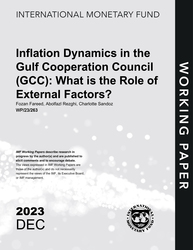
Inflation Dynamics in the Gulf Cooperation Council (GCC): What is the Role of External Factors?
Inflation Dynamics in the Gulf Cooperation Council (GCC): What is the Role of External Factors?
READ MORE...
Volume/Issue:
Volume 2023
Issue 263
Publication date: December 2023
ISBN: 9798400263040
$20.00
Add to Cart by clicking price of the language and format you'd like to purchase
Available Languages and Formats
| English |
Prices in red indicate formats that are not yet available but are forthcoming.
Topics covered in this book
This title contains information about the following subjects.
Click on a subject if you would like to see other titles with the same subjects.
Inflation , Economics- Macroeconomics , Economics / General , Inflation , external shocks , GCC , panel data , GVAR , , GCC inflation , inflation dynamics , GCC country , GCC economy , inflation in GCC , Nominal effective exchange rate , Oil prices , Supply shocks , Food prices , Global
Summary
Inflationary pressures have intensified in the Gulf Cooperation Council (GCC) in 2021-2022, mainly driven by a pick-up in tradeable goods inflation. Despite this increase, inflation remained relatively contained as compared to regional comparators. This paper aims to provide a comprehensive analysis of inflation dynamics in the region, with a focus on external factors because of GCC’s high reliance on international trade. Using a Global Vector Autoregressive model with quarterly data from 1987 to 2022, we find that external factors such as the imported inflation from main trading partners, mainly driven by China, and nominal effective exchange rate (NEER) are the main drivers of inflation in the GCC region. Additionally, we find that the direct pass-through of international commodity price shocks such as oil and raw agricultural materials is somewhat limited, after controlling for trading partners’ inflation, which can be explained by the prevalence of subsidies and administered prices in the region. Overall, since external factors are the main drivers of domestic inflation in the GCC, an increased focus on diversification, promoting food security, and ensuring prudent central bank policies, including through effective liquidity management frameworks, can play a key role in managing this impact.
Copyright © 2010 - 2026
Powered by:
AIDC



